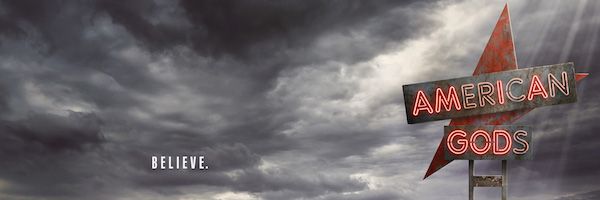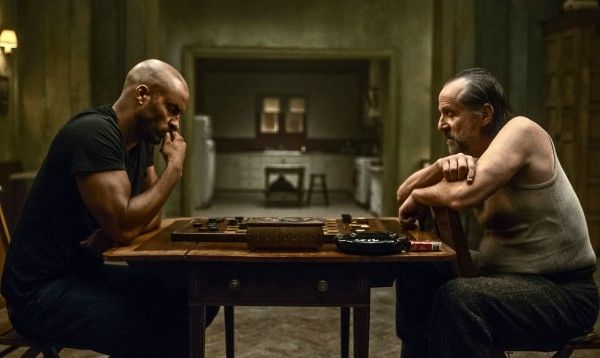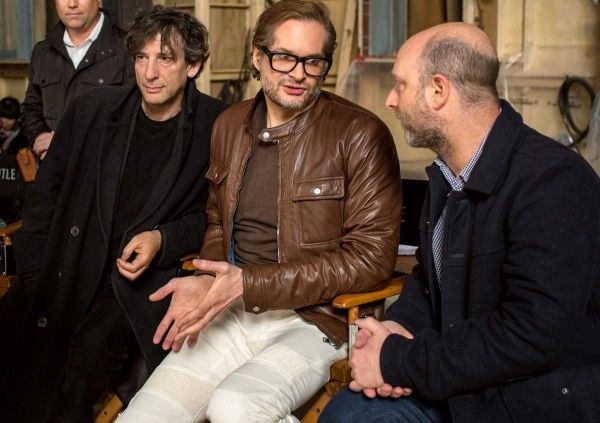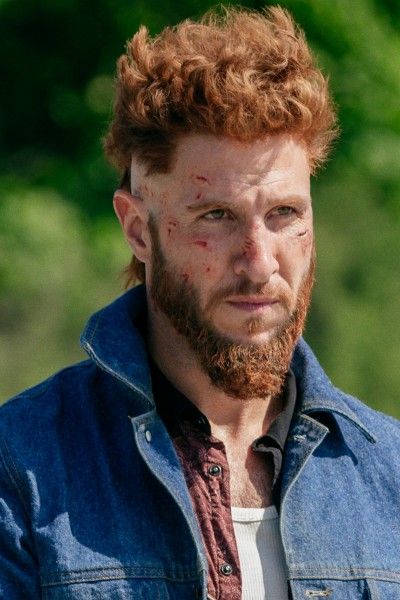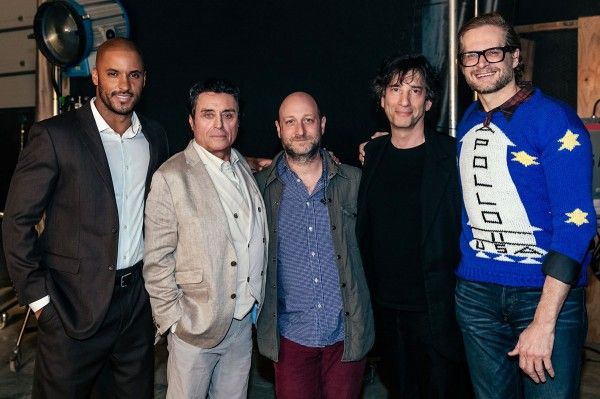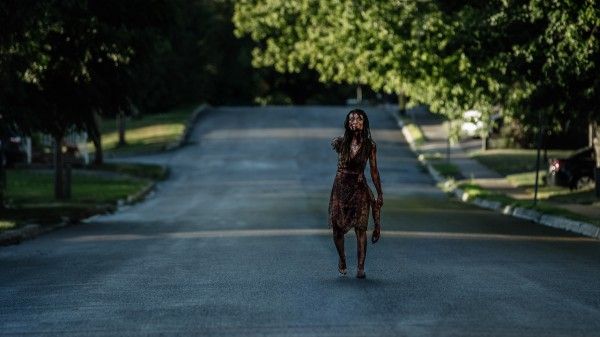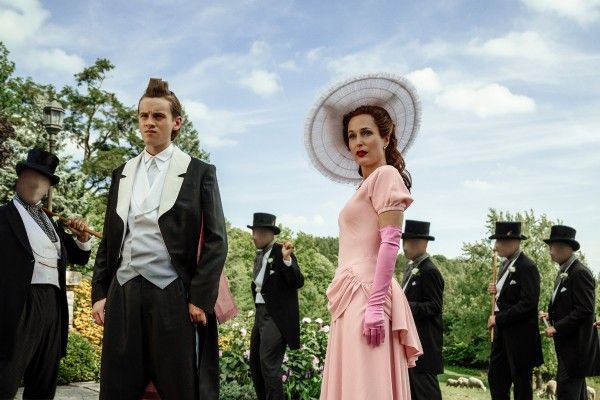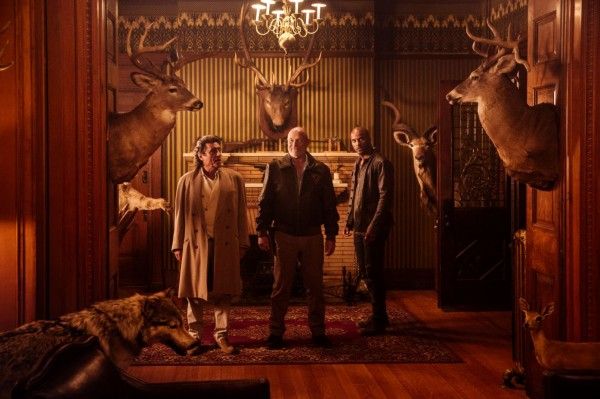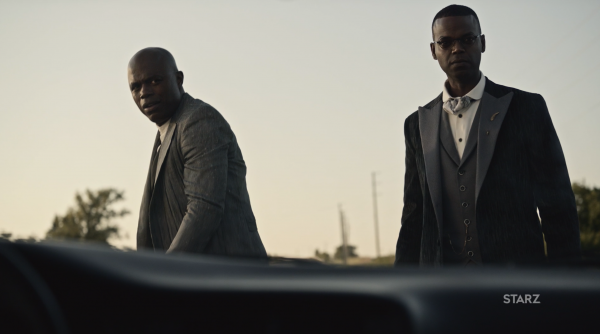From showrunners Bryan Fuller and Michael Green, and adapted from the best-selling book by Neil Gaiman, the Starz series American Gods weaves a provocative tale of faith and belief, or our lack thereof, unlike anything that’s ever been on TV before. When Shadow Moon (Ricky Whittle) is released from prison following the death of his wife (Emily Browning), he meets the mysterious Mr. Wednesday (Ian McShane), with whom he makes a deal that will change the course of his entire life. As he finds himself in the center of a world that he struggles to make sense of, a war between the Old Gods and the New Gods starts to bubble over in ways that are both horrific and mind-blowing, and that you won’t be able to take your eyes off of.
During this recent phone interview with Collider, show creators Bryan Fuller and Michael Green talked about never receiving any push-back on the way they wanted to tell this story, the most difficult and challenging aspects of this production, deciding how much of the story in the book to tell in this first season, learning to slow the story down and live with the characters, why they chose to cut certain scenes, the Old Gods vs. the New Gods, and what they’re excited about with the finale.
Collider: When the idea of turning this book into a TV series came about, did you ever think it wouldn’t be possible, or did you become that much more determined to find a way to make it possible?
MICHAEL GREEN: There was nothing we were ever afraid to try. It’s more that you write it down and start talking to the right people about how to actualize it. There was never any push-back from the people who had commissioned the show or had chosen to pay for the show to try to see those things. Everyone had read the same novel and loved that novel enough to back an attempt to bring it to life. We knew there were things that were going to be difficult and challenging, but ultimately those weren’t the things that were the most difficult and challenging.
So, what ended up being the most difficult and challenging then?
BRYAN FULLER: The most difficult and challenging aspects of the production were producing a road show, not having standing sets, and every episode being very ambitious with multiple locations and multiple headspaces. That runs counter to how television operates efficiently. Really, the challenging aspects of the show were logistically producing a road show with little or no standing sets to offer relief.
GREEN: And the same thing was true in reinventing the tone of the show in things like sound mixes. Most shows live in replication of established ideas. You go back to the same buildings that sound a certain way. You go back to certain feelings and tones that want to be given a sonic landscape that’s similar. Whereas this show, each episode will exist in anywhere from three to six discreet tones, and each episode will then shift into wholly different tones. Every once in awhile, we’ll go back to something familiar, like riding in a car or Jack’s Crocodile Bar, but other than that, every episode was its own new genre film to score and to sound mix. Normally, something where showrunners can catch up on sleep was as difficult as prep and production.
When it came to telling this story, what most excited you and what most scared you about it?
FULLER: There was little that scared us, beyond being afraid that we wouldn’t have enough money to pull off the show.
GREEN: All of our fears were budget-based, and that seems so practical. In terms of excitement, we were excited to write about the themes that the book discusses. The characters were rich and the book offered so much visual candy that we were excited to eat, and eat until our tummies got full. The idea of talking about faith and religion in America was very interesting, very appealing, and under-served in a world where there are 430 scripted television shows.
FULLER: There’s too many!
GREEN: There are too many shows, and not enough talking about religion and few celebrate religion. One of the things that may surprise people who hear about the show is that there’s a show called American Gods, about faith and religion in America, that enjoys religion and celebrates it, and that thinks about it seriously and takes it seriously and wants to talk about it seriously.
There is so much story to unpack with these characters, so how did you decide how to go about breaking up the novel into seasons, and figuring out how many seasons you would need to tell the story that you want to tell?
FULLER: We started out with one idea of what we were going to do, in terms of how much of the book we would be burning through in the first season, and that changed, fairly immediately. And there were things that we had in the outlines of the first four episodes, as we originally intended to shoot them, that don’t occur in the first season anymore, and that we pushed down to the second season because we kept on finding these nooks and crannies in our English muffin of American Gods that we wanted to feel with butter and joy, as opposed to rushing past and not digging in. We looked at certain tentpole moments, like the Laura episode, where we new we wanted to stop, rewind and reacquaint the audience with the Laura Moon that actually existed, as opposed to the Laura Moon that Shadow saw, as his wife. That was our first valuable lesson in slowing the story down and living with the characters and telling a more emotional, grounded story than rushing into the magic.
Did you have any particularly crazy ideas that didn’t make it into the production, or is all of that in there?
GREEN: Oh, no, there were a lot of crazy ideas that didn’t make it into the production or didn’t make the cut because we cut them either before trying to do them or realized that we didn’t do them well enough. We only wanted to present episodes that we could stand by. We were going to put out no weak material, and sometimes that meant cutting scenes that we liked. There is an episode that we dismantled and folding into others, which reduced our episode order. It was always about, how do we honor this beautiful book well enough, with material that lives up to its caliber?
Did you ever have to fight for any of that stuff, like dismantling and episode and reducing your episode order?
FULLER: What was refreshing for us, or at least helpful, was that when we cut both Episodes 3 and 4 in half and sewed the best parts together, we realized that we were dropping an episode. But it was also returning to an earlier iteration of the structure of the season that we essentially had plotted out in nine episodes, and then stretched Episode 3 into two episodes and ultimately found that our first instincts were correct, so we ended up removing the things that we added, late in the game, to accomplish another episode. Fortunately, we had the support of the studio and the network to tell the best version of the story, in as many episodes as we needed to tell that story.
Is there one moment that you’re most looking forward to seeing the fan reactions for?
GREEN: Well, since we’re working on it, I want to show them the finale because I’d like it to be done. There are several things in the finale that I’m excited to share. In the same way that the fourth episode represents a pivot in expectations for what the show might be about, the finale represents another pivot and discusses, fairly frankly, the complicated experience women and goddesses of power have had throughout history and that they are an energy that are sometimes accepted, celebrated and worshipped, and sometimes just destroyed and put down and toppled, for no other reason than that they make male power feel inferior. It was a chance to dig a little deeper into the deep acting wells of Yetide Badaki (who plays Bilquis) and Kristin Chenoweth, as Easter.
How did you decide the way you wanted to portray the differences between the Old and New Gods, whether visually, musically, etc.?
FULLER: We wanted to keep the Old Gods as gritty and rustic as we could to demonstrate the well-worn aspects of their religion and the consequences of going without faith for so long. In juxtaposition to that, the New Gods are relatively slick and updated with shiny new technology that illustrates just how valuable and pertinent they are, in their own religions.
GREEN: Each God does have his or her soundspace, as well, with the instruments chosen and style of music chosen. Even the type of reverb given to their literal soundspaces was selected to be appropriate to them, whether it’s something open and churchy, small and intimate, or an arena space or a modern space, as well as whether the walls echo like glass, metal or something older, like wood.
If Jonathan Tucker had been available for more episodes, would we have seen more of Low Key Lyesmith in Season 1, and is that a character you’re looking forward to getting deeper into, in Season 2?
GREEN: Give it time. We love him, as much or more than he is effusive about his time on the show. There’s plenty more to do with him, and we can’t wait.
Since we don’t get to see him in the first few episodes, what can you say about Mr. World (Crispin Glover) and how his views as leader of the New Gods differs from Mr. Wednesday and the Old Gods?
FULLER: What’s interesting about the Old Gods and the New Gods is that they’re both coming at humanity with the intent to distract us from what it is to be human. It’s about whether you’re more inclined to look at your iPhone for a distraction, or you’re more inclined to older forms of worship, like going to church to try to find peace within yourself, and looking for greater meaning in the life that you don’t understand. Both of those aspects of religion – whether it’s New God or Old God – are about helping us suffer through our own humanity with as few psychological scars as possible. That’s the similarity that they have. One of the things that excited us is the shifting perspective of who’s right in their approach to humanity, the New Gods or the Old Gods?
GREEN: You’ll get to meet him, for the first time, in Episode 5
This show has such a fantastic cast, and I especially enjoyed the conversations between Shadow Moon and Mr. Wednesday. Was there anyone who was not familiar with the book or this material, who needed the most convincing to sign on for something like this?
GREEN: Ian McShane hadn’t read the book until he’d read the scripts and was interested in it. He wanted to know where things would be going, but by then, he was already tipped forward in his chair. One of the members of the Starz team, at a senior level, although he would like to read the book, he hasn’t yet because he felt that at least one person in their camp should remain willfully ignorant of the book’s delights, so that someone there could be experiencing it, for the first time, as the episodes came. But it’s hard to find someone who isn’t at least partially aware of Neil Gaiman’s reputation or the book’s reach.
What do you most enjoy about watching the dynamic between Shadow and Mr. Wednesday, with the likes of Ricky Whittle and Ian McShane giving it so much life?
GREEN: It’s fun watching the two of them just got on. They like each other quite a bit. In a very, very English way, one of the first conversations they ever had was about which football team they worship, and they worship at the temple of the same one. They’re from the same part of England, so they watch those games together. They adore each other and have very good chemistry, on and off screen. Watching their interpersonal chemistry turn into Shadow and Wednesday’s is enjoyable, every time. I love watching those scenes.
By the end of these eight episodes, will we feel like we have an understanding of how all of these characters intersect and connect, and what that means in the larger scheme of things?
FULLER: We make some pretty grand statements about the state of religion in America, what religions are growing and not growing, and what it is that the Gods are looking to accomplish. It feels almost like a mission statement, at the end of the season, to recontextualize everything that you’ve seen beforehand, in terms that the New Gods can quantify clearly, in their understanding of how the world works. So, there are some aspects to getting an additional insight that Gillian Anderson delivers beautifully and strangely and perfectly that will hopefully provide some sort of framing for how to continue thinking about the themes that we’ve established in this first season, as you wait for a second season, should we get one.
People who haven’t read the book are going to get to the end of this first episode and wonder where you’re going with this story. What would you say to them? Since nothing is as it seems, on the surface, with this story and with this show, what mind-set should viewers have, going into this?
GREEN: The show is entertaining and, ideally, thought-provoking. It doesn’t behave any better than the book did.
FULLER: It’s a naughty, naughty book.
GREEN: In terms of conforming to traditional expectations of literary structure or content, this show doesn’t adhere to structural norms or, we’re told, content norms, but that was not our intention.
Well, thank you so much for making such an exciting and compelling TV series! I can’t wait to see more of it, just as much as I can’t wait to see the conversations that it sparks among audience members.
FULLER: Us too!
GREEN: Here’s hoping! We hope they do talk about it!
American Gods airs on Sunday nights on Starz. You can read Chris Cabin's review here.

